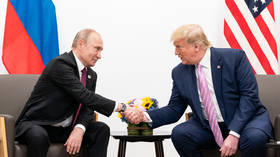Privatization underpinning Russian banking shares

Over the last month the RTS and MICEX indexes have added about 6-7% while major Russian banking stocks have added 17-20 %, leading global bank stocks in price growth.
The price/capital multipliers of Sberbank (2.4x for 2010) and VTB bank (2.0x for 2010) have already exceeded average multipliers in Latin America, EMEA, and global banks, leaving them trading at a discount only to the ‘overheated’ shares of the Bank of China. A range of economic indicators are providing positive signs for investors into Russian banks.Lending upIn September lending to the real sector of economy quickened considerably, with the Sberbank credit portfolio growing 5.4% and smaller lenders also increasing lending.Non Sberbank lending to the non financial sector is up 1.8% for the month and 30% for 9M 2010.Reserves in placeBanks are either near the peak or past the peak on reserve.Sberbank President, Herman Gref, says Russia’s largest bank passed the peak of reserve formation in September, with VTB Financial Director, Herbert Moos predicting the second largest will pass it in 4Q 2010.Excluding Sberbank, reserves were down 1.2% in September, with some smaller players, including Bank St Petersburg reducing reserves during 2Q 2010, Gazprombank past the reserve creation peak, as Sberbank continued to charge reserves at 15 billion roubles per month over the course of this year.Boost to bottom lineDecreasing provision charges will positively impact banks net profits. Herman Gref has raised Sberbank’s FY 2010 net profit forecast to 120-150 billion roubles from 100-120 billion, and the Bank of Russia has revised its FY 2010 pre-tax profit forecast, for all Russian banks, from 400 to 500 billion roubles.Beyond fundamentalsBeyond fundamentals, the slightest whiff of a banking consolidation or buyout phases is also supporting the market, with VTB purchase of Transcreditbank, announced at the start of October, as well as reports of a possible Sberbank interest in buying an investment bank – maybe Troika Dialog or Renaissance Capital.In our opinion, all these factors are already priced in. But there are other equally important factors at play.Privatizations 2.0The rally in Russian banking shares has coincided with the beginning of a large-scale public campaign of bank privatization, which will include VTB and Sberbank.The expectation of privatization could play a more significant role in bank share price growth than forecast loan portfolio growth or stabilizing net interest margins. VTBThe pilot project for privatization 2.0 is the placement of a 10% stake in VTB.Since first being mooted more than a month ago, a reported sale to strategic investor TPG Capital, the VTB share price has boomed 20%, while the RTS has climbed 7%.Interestingly the market isn’t factoring in the likelihood of a discount to market for the placement of the State’s VTB stake to a core strategic investor, or the departure of Geoffrey D. Fink, Head of TPG’s Russian office, for Dubai Delta Partners, a few weeks ago.SberbankThe sale of state shares of Sberbank is also being prepared, with bank officials not discounting the possibility that 3-4% from the State’s 7.58% being offered internationally as depositary receipts, with another stake placed with strategic investors.The placement of the State’s stake with foreign strategic investors, as well as the depository receipt programme, will theoretically minimize any negative impact of excess supply. However, the launch of the scheme and the success of a deal to further privatize Sberbank will depend on privatization of VTB.Priced in and priced out?Despite risks, investors are now betting on rising Sberbank and VTB share prices. Their behaviour is underpinned by a belief that the state will seek to maximise prices, and particularly price them well above where they are now. We believe that future growth in share prices of the banking sector, in addition to improving fundamentals will, first of all depend on speculative pre-privatization factors. VTB and Sberbank 2007 SPO/IPO minority shareholders could get a chance to close their positions with a profit. The state, however, should not have to focus too much on maximizing the value of assets offered for privatization. If the share prices of bank stocks sold at overvalued prices dropped significantly, it could pose a challenge for the sale of other State stakes.Egor FedorovAnalyst, Bank of Moscow














